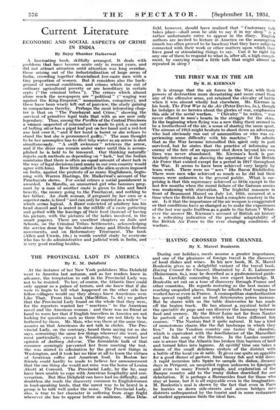Current Literature
ECONOMIC AND SOCIAL ASPECTS OF CRIME IN INDIA
By Bejoy Shanker Haikerwal
A fascinating book, skilfully arranged. It deals with problems that have become acute only in recent years, and did not attract attention until attention was long overdue, those arising out of the industriajization of large areas of India, crowding together desocialized Jow-caste men with a tiny proportion of women. But it considers also the back- ground of normal conditions, and crimes which rise out Of ordinary agricultural poverty or are hereditary in certain • septs (" the criminal tribes "). The crimes which almost alone reach the newspapers are " political " (" waging war against the King-Emperor," assassination, conspiracy), and these have been wisely left out of purview, the study gaining in compactness thereby. Perhaps the most interesting chap- ter is that on ". The Panchayat and Crime," showing . the survival of primitive legal tests that with is are now Only legendary. Thus; among the Pardhis of the CeirtrafPitivinees a woman suspected of miscpnduct is' made to pick a coin-out of boiling oil or has a pipal leaf put oa her-hand-and-a red-hot axe laid over it;". and if her hand is burnt or she refuses to stand the test she is pronounced guilty The man thought to be her accomplice, has to dive- intp water as an arrow is shot simultaneously. " A swift swimmer " retrieves the arrow, and if the diver can remain under water until this is accom-: plished he is held to be' innocent.: Our thinking naturally rejects such methods as depending on " luck,' but the Indian maintains that there is often an equal athoutit of sheer luck in the way of legal decisions: (and many in our own country would agree with him). How little suited is the alien system imposed on India, against the protests of so many Englishmen, begin- - ning with Warren Hastings, Dr. Halkerival's account of the Panchayats shows. . For social crimes a social punithnient is awarded. In Mandla, an unmarried- girl who becomes •preg- nant by aE man of another caste _is given-An him and fined heavily, the Money going to,the. Panebnyat, and nothing to her father. An Audh ,rornan, if- pregnant hy-her own or a superior Caste, isfined "and can only.be married as a widow"— which seems logical. A Bets& convicted of adultery has _ head shaved and is Seated in the muddle cird-easte gathering and pelted with the leavinnsat their food (instead of having his picture, with -the-Pictures of the ladies involved, in the smart papers). There are excellent- 'chapters on Jails: and Schools, 'on the Criminal Tribes Settlements, acknowledging the service done by-the Salvation Army and. Hindu_ Reform movements, and on Reformatory Treatment. The book (Allen and Unwin, 10s.) is worth careful` study by everyone who has to do administrative and judiciafIvnrk in India, and is very good reading besides.










































 Previous page
Previous page